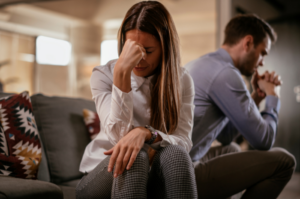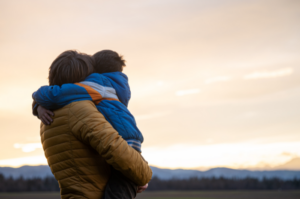Everyone has, to some extent, experienced isolation during Covid-19 restrictions. Some are quarantined after an infection or exposure to the virus. Others, due to age or vulnerability, are separated from those they love. This has tremendously impacted and even prevented major life events such as graduations, weddings, and, perhaps most devastating, funerals.
Supporting loved ones who are nearing the end of their lives has been severely impacted. But because of our universal bonding needs, many people have become highly creative in their attempts to connect.
One resourceful family with 6 adult children was challenged by their younger sister to visit their 94-year-old mother, in hospice, every day for the rest of her life—even though it means only seeing her through the nursing home window. One son lives nearby, three daughters take turns flying in from various parts of the United States, and two sons who are missionaries in Africa visit by video chat.
Says one daughter, Linda Smith, “Inter-Faith Care Center has been very accommodating, bringing Mom down to the glass doors by the courtyard and helping Mom answer her cell phone so we can begin our daily visit. Mom is still sharp, so we talk about memories, share news, share photos, ask about her life, sing songs, or ask her to pray. It is a thrill for us to hear this old saint pray!”
Other residents are not so fortunate, as the Care Center has noticed an increase in cognitive decline due to the social isolation from Covid-19 precautions.
For those who have lost a spouse, quarantining has the potential to severely magnify the already devastating loneliness of widowhood leading to complicated grief—the extension of more severe symptoms over a longer period of time. Regardless of present social conditions, corporate grieving, or mourning, is essential.
Personal contact is imperative to the bereaved, as an old proverb says, “Grief shared is grief halved”. When a person loses a spouse, their options are to either withdraw or to expand their support system to compensate for the loss of their daily companion and confidant. Since connecting in person may be limited during Covid-19, many people are connecting through social media and video conferencing.
Often, it can be difficult for the grieving person to initiate contact. It is important for family, friends, and churches to increase their awareness of the widowed and be proactive to close the communication gap. This need has required helping organizations to stretch beyond their normal services.
Support groups for those in grief provided by such organizations as GriefShare, The Widows Project and the Seattle Widow’s Club are meeting via video conferencing, outdoor socials, and one-on-one mentoring. The Widows Project also provides a prayer line specifically for widows at 1-844-4WIDOWS (seven days a week from 12 p.m. to 12 a.m., Pacific Standard Time).
Because quality time and physical touch are critical to one recovering from grief and loss, these obstacles must be creatively overcome in order to prevent complicated or extended grief. To provide this much-needed care, some families and friends are choosing to quarantine together after an appropriate time of staying at home. Many are heading outdoors for socially distanced walks or hikes.
Mental health crises, including complicated grief, and suicide attempts have multiplied during the virus. As an essential service, Meier Clinic therapists have continued to see outpatient and Catalyst (partial hospitalization) clients.
The Christian coping with the compounded loneliness and isolation of grief and Covid-19 has the added support of a church family and the power of the Word of God. Psalm 68:6 states that “God sets the lonely in families”. God knows and cares for the grieving—even collecting their tears in a bottle and writing them in His book (Psalm 56:8). God wants to carry the burden of the grieving as He urges in I Peter 5:7, “Casting all your care upon Him, for He cares for you” (I Peter 5:7). It’s important to remember that the grieving person is never truly alone as Psalm 23:4 reminds us, “Yea, though I walk through the valley of the shadow of death, I will fear no evil: for Thou art with me; Thy rod and Thy staff they comfort me”.
Finally, some practical tips may be helpful for those coping with grief during Covid-19.
- Stay grounded spiritually. Luke 5:16 says that even Jesus “often withdrew to lonely places and prayed”. We can take advantage of alone times to grow closer to God.
- Reach out for and provide contact. Don’t be afraid to make your needs known. There are people who would love to help if they knew of your need.
- Hug whenever safe and possible! We need physical touch to maintain our mental health.
- Stay connected. Look for opportunities to calendar regular and safe activities with family and friends.
- Exercise. Physical activity can refresh the mind. allowing for a new perspective on grief, as well as maintaining physical health.
- Develop a routine. Grief can be disorienting. A consistent, daily routine can relieve the mind of many choices, leaving brainpower for the hard work of grieving.
- Get sufficient sleep. While sleep can sometimes be problematic, it is absolutely necessary for the brain to process grief. Please see your doctor or mental health professional if sleep problems persist.
- Eat a balanced diet. While it can be easy to forget to eat during grief, proper nutrition is essential during stressful times.
No matter what we face during these unprecedented times, it’s important to remember that one Truth remains steadfast; Jesus has promised, in Matthew 28:20, that He will be with us always, even to the very end of the earth.
For more information on GriefShare, The Widows Project and the Seattle Widows Club, see the following links:































































